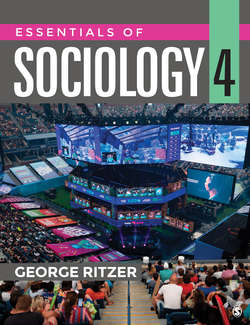Читать книгу Essentials of Sociology - George Ritzer - Страница 56
На сайте Литреса книга снята с продажи.
Critical Theory
ОглавлениеWhile Marx’s work was critical of the capitalist economy, critical theory shifts the focus to culture. Marx believed that culture is shaped by the economic system. In contrast, the critical school has argued that by the early twentieth century, and at an ever-accelerating rate to this day, culture has become important in its own right. Furthermore, in many ways it has come to be more important than the economic system. Instead of being controlled by the capitalist economy, more of us are controlled—and controlled more often—by culture in general, specifically by the culture industry.
The culture industry consists of the rationalized and bureaucratized structures that control modern culture. In their early years, the 1920s and 1930s, critical theorists focused on radio, magazines, and movies. Today, movies remain important, but the focus has shifted to television and various aspects of the internet, especially Facebook. These are critiqued for producing, or serving as an outlet for, mass culture, or cultural elements that are administered by organizations, lack spontaneity, and are phony. Two features of mass culture and its dissemination by the culture industry are of particular concern to critical theorists:
• Falseness. True culture should emanate from the people, but mass culture involves prepackaged sets of ideas that falsify reality. The so-called reality shows (e.g., Survivor) are a contemporary example of mass culture. These programs are also highly formulaic. They are presented as if they are authentic, but in fact they are scripted, highly controlled, and selectively edited—although in a different way than fictional dramas, comedies, and soap operas are. They are also false in the sense that they give consumers of mass culture the sense that there is a quick and easy route to fame and fortune.
• Repressiveness. Like Marx, the critical theorists feel that the masses need to be informed about things such as the falseness of culture so that they can develop a clear sense of society’s failings and the need to rebel against them.
The effect of mass culture is to pacify, stupefy, and repress the masses so that they are far less likely to demand social change. Those who rush home nightly to catch up on their favorite reality TV shows are unlikely to have much interest in, or time for, revolutionary activities, or even civic activities and reforms.
Critical theory can be applied to some of the newest media forms, such as YouTube, Twitter, Snapchat, Instagram, and especially Facebook (Denegri-Knott and Zwick 2012). Despite there being plenty of false and stupefying content on these sites, along with all the edifying material, the sites are not totally controlled by large rationalized bureaucracies—at least not yet. Almost all the content that appears on sites such as YouTube, Facebook, and Twitter is provided by those who also consume material on the sites. The sites exercise little control over original content; that content is arguably spontaneously produced by those who use the sites. It’s tempting to conclude that these new aspects of the culture industry are not assailable from a traditional critical theory perspective. Although sites such as Facebook are not yet huge bureaucracies, they do structure what is to be found there, especially through the use of algorithms. In addition, at least some of that which is to be found there is false.
Ask Yourself
Do you see evidence of critical theory’s ideas of falseness and repressiveness in the elements of mass culture to which you are exposed? If so, what forms do they take?
